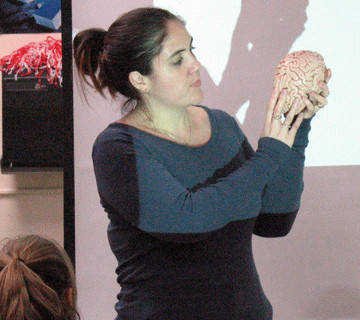Speaker guides students through the brain

Local high school students are learning about the functions of the brain in addition to learning what happens to the brain after drug usage.
On Dec. 20, Catherine Swanwick, a postdoctoral fellow with the National Institutes of Health in Bethesda, Md., delivered a presentation to teach Fort Scott High School students about the brain and its many functions.
Swanwick said that she wanted to talk with the students about the way that their brains work.
"Part of being a scientist is communicating our biomedical knowledge to the public," she said. "The more people know about how the brain works, the better they will take care of it."
Swanwick said she did not always like science. However, while in college, she took a neuro-science class and really enjoyed it. This changed the course of her career, and now she wants students to realize that scientists are regular people.
"If I can do it (become a scientist), they can do it," she said. "I would encourage students who think they are not interested in science to pay attention to scientific reports in the news, and if they find any of those subjects fascinating, then they should read up on them," she said.
Swanwick said that some amazing discoveries are being made in areas like nanotechnology, which is the engineering of functional systems at the molecular scale. She said some scientists have used gene therapy to restore vision to blind dogs. In addition, scientists have also created carbon "nanotubes" that can potentially treat spinal cord injuries by allowing neurons to regrow. Swanwick said that one place students can access cutting edge science news is in the journal Scientific America, which can be accessed on the Internet at www.sciam.com.
Swanwick said that she encourages students who think they might be interested in science to volunteer time at a university lab.
"If students already think they might be interested in science, then I would encourage them to work or volunteer over the summer in a research lab at a university," she said.
She added that many labs will hire high school students to complete some of the minor lab duties. Working in a university lab during summer break would give the students the opportunity to discover what it is like to conduct scientific research.
After discussing with the students the different parts of the brain in addition to their functions, Swanwick shared with them about drug abuse.
"I wanted the students to know that drugs actually do create serious damage to your brain. The brain is an amazing structure: the more you use it, the smarter you will be, but if you abuse it, you will create long-lasting damage that cannot be fixed," she said. "Drugs work by manipulating chemicals in the brain called neurotransmitters. These chemical manipulations temporarily make you feel good, but they are simultaneously depleting your long-term neurotransmitter supply, so you will end up with serious brain damage. Inhalants are also damaging, because they destroy a substance in the brain called myelin, which allows your neurons to communicate properly. If the myelin is gone, you will have problems walking, talking and thinking," she said.
Swanwick also told the students that for most science or engineering advanced degrees (master's degrees or PhDs), the government will pay for tuition and fees.
In addition, she said, the government will provide these students with a stipend of approximately $20,000 a year. According to Swanwick, this is different from advanced degrees at places such as medical schools or law schools, in which a student would need to pay for everything on his or her own.
Swanwick is the daughter-in-law of FSHS family and consumer science teacher Nancy Swanwick.
By speaking to the local group of high school students, Swanwick said, she was able to contribute to her husband's home town.
Although Swanwick works for the National Institutes of Health, she said that when she spoke to the students at Fort Scott High School, she was not speaking as a representative on behalf of the organization that employs her. All comments that Swanwick made were strictly her own opinions, and they are not meant to represent NIH in any way.
